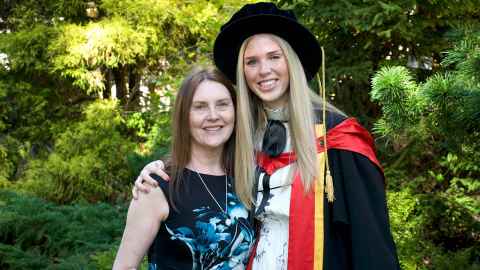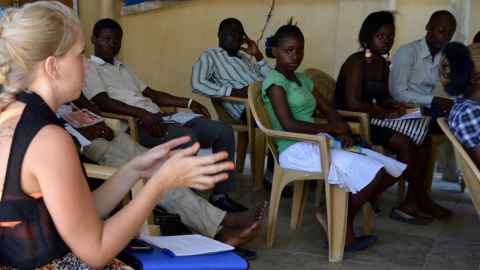Looking beyond the safari lens in Kenya
7 May 2019
Concern for the sexual wellbeing of girls and young women in rural Kenya has taken University of Auckland lecturer Laura Chubb on an extraordinary journey.

University of Auckland social work PhD graduate Laura Chubb previously spent seven months living in rural communities near Mombasa County on Kenya’s coast as part of her doctoral thesis research.
A prior partnership with a local Kenyan NGO, Kwacha Afrika, took Laura to Kenya on her first trip where she did her masters research on women living with HIV.
“What I noticed was that the lack of conversational spaces for sensitive topics related to sex created silence around violent incidences, sexually-transmitted infections, and more generally, the day-to-day questions that young people have as they negotiate their sexual identities,” she says.
Finding the issue compelling, she decided to return to Kenya for her doctoral research and had an immersive experience; living at first with the same Muslim family she had stayed with on her initial visit.
The house was made of a basic cement compound with limited power, and was prone to flooding. Water had to be stored and used throughout the week and cooking was on a Jiko, a charcoal-burning, portable stove.
Later she moved to a new area, Bamburi, after a reported rise in youth gang activity related to the Al-Shabaab – a jihadist fundamentalist group based in East Africa – close by.
“I lived in a modest, fourth floor apartment, eating local street food most nights and cooking with members of my research team on the others,” she says. “I didn’t have a stove, but a hot-plate burner and a small mini-fridge. We used the apartment space as one of our research hubs; my walls were decorated with diagrams and writing about the research!”

Young Kenyans are continually represented in the health statistics as a key population vulnerable to a myriad of sex-related risks, including STDs, infection with HIV, teen pregnancy and sexual violence; but these issues are rarely discussed openly.
“Sex is a taboo topic in Kenya," says Laura. "It's viewed as only socially acceptable after marriage, making opportunities for open discussion between generations rare to non-existent.”
She says only a small number of studies worldwide explore what impact conversations about sex and sex-related issues between generations might have on young people’s sexual identity; in Kenya, there was only one such study.
Life for the Mijikenda Peoples – the overarching tribe name for a group of nine related Bantu ethnic groups – she worked with, is labour-intensive.
“Mijikenda typically live in lower-socio economic environments, work the land, grow much of Mombasa’s food and make up the majority of the labouring population.
"In Mombasa county, Mwakirunge Ward has the highest percentage of people without any formal education, the lowest level of sanitation in the county and severe environmental challenges resulting from an unmanaged dumpsite.”
She says these factors taken together produce an environment of vulnerability to risky and violent sexual encounters, as well as a myriad of other health and social concerns.
Rather than a tourist, I positioned myself as an explorer in this doctoral research; I also wanted to be an ethical explorer, as I was dealing with people’s lives.
Laura's research focused on the use of the baraza, a traditional East African public meeting space, as an emerging method being used in Kenya as a viable research tool in seven different studies.
“However, during my PhD research was the first time the baraza had been adapted as inter-generational dialogue space for talking about sex," she says.
A key challenge was gaining community members’ trust so she could work with them to identify the severity of sex-related issues and help them design their own solutions.
And bearing in mind that in Swahili, safari means journey, she says she kept envisioning the mountain of foreign tourists who come to Kenya each year and only know it through the lens of safari binoculars.
“Rather than a tourist, I positioned myself as an explorer in this doctoral research; I also wanted to be an ethical explorer, as I was dealing with people’s lives.”
She established a sense of mutual understanding through her willingness to try to speak the language where possible, wear appropriate clothing, and abide by cultural customs and protocols when she was in the baraza space.
Laura's next goal is to begin translating the findings from her Kenyan research into New Zealand and Pacific contexts.
“I believe if we engage more with indigenous communities through traditional conversation spaces on sensitive issues, from sexual health, teen suicide, disability and domestic violence through to climate change practices, we will have a far better chance of achieving these ambitious goals of health and wellbeing.”
Originally from Newfoundland on Canada’s east coast, Dr Laura Chubb coordinates and lectures in six courses in the School of Counselling, Human Services and Social Work at the Faculty of Education and Social Work.
Media inquiries
Julianne Evans | Media adviser
Mob: 027 5625868
Email:julianne.evans@auckland.ac.nz